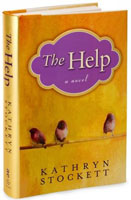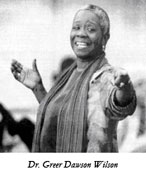What We're Reading Now
30 March 2011
Allison is glad that a Virginia Festival of the Book event prompted her to reread The Help by Kathryn Stockett. Sometimes books can challenge our thinking in important ways.
Tags: allison read, diversity, greer dawson wilson, virginia festival of the book
If you were on Facebook or LinkedIn earlier this month, you probably noticed that I was pretty excited about the Virginia Festival of the Book. We have a lot of wonderful festivals in Charlottesville, but this one is my favorite. This year was even more special because my mother, Barbara Linney, was on a panel for her book. When we weren’t getting ready for her author responsibilities, we fit in as many other events as possible. I’m so glad an Evening with Kathryn Stockett, hosted by John and Renee Grisham, on Wednesday, March 16th made the list.

The Help has been on the New York Times Best Sellers Hardcover Fiction list for 103 weeks with millions of copies sold. If you haven’t read The Help yet, let me give you a brief synopsis. It’s the early sixties and Eugenia ‘Skeeter’ Phelan longs to write the great American novel and is just getting her arms around a growing sense of anger at the social injustices of her Jackson, Mississippi community. With Aibileen and Minny as her guides, she takes on the dangerous task of collecting the stories of the black women who worked as maids for the wealthy (and not so wealthy) families in Skeeter’s hometown. Some families are nicer to "the help" than others and many proclaim a feeling of love and sometimes gratitude, but in general the racism that underlies these relationships is outrageous. Stockett brings these painful and poignant stories to light and builds rich, multi-dimensional characters that will stay with you for a long time, teach you important things and give you many reasons to reflect, mourn, celebrate and find a path to a brighter future for us all.
While Stockett has enjoyed rave reviews and international acclaim, she’s also had her fair share of critics. Some people believe that she had no right as a white woman to try to take on the voices of African American women, that she did so in a less than respectful way, or that she was downright delusional to believe that the help felt any sort of sincere love for the families in their charge. Stockett addressed these issues and others in her conversation with Renee. I admired her candor about the criticism she’s received and how she’s used the feedback as a vehicle to explore her own prejudices even further.
As mama and I drove home from the event, we explored our own history. I was born in Charlotte, NC in 1972 and we had black maids for the first 10 years of my life. Florence and then later Ruth came twice a week and were extremely helpful to my mother as she struggled with the demands of young children, keeping a house, and going to graduate school. I remember these women with great love and admiration. Both could manage my high spirited energy and bring out the best behavior in me. Mama remembers the way the other doctors' wives just assumed she would take on this kind of help and how grateful she was to have them in our home. She also remembers her commitment to treating them well, paying them fairly, and asking rather than demanding anything. I think ours probably was a good home to work in; however, I can’t help but remind myself and others that having black women as maids likely influences how we thought of black people in general. Fortunately, by the 70’s I also had black teachers in school to round out my definition of what black people could do for a living, but I know that it’s probably impossible to determine how the fact that I only saw black people in just a few professional roles as a child impacted me. Thank goodness children today have a broader definition of what African Americans can do for a living—including being President of the United States—but that doesn’t mean kids (or grown-ups) are getting exposed to enough difference in our everyday lives. Left to our own devices we often default to what’s comfortable rather than what expands our world view.

When I finally came to UVA as an undergraduate, I know that I sought out my African American mentor, Dr. Greer Dawson Wilson, on purpose. I wanted to learn everything I could from her about consulting, coaching, team building, communication and racial reconciliation, including the courage to confront my own racism. She died almost seven years ago but before she left, she taught me incredible lessons about how to live a better life including the mandate that I continue to examine how privilege has impacted me and that I bravely ask myself and others, “What else do we need to do to create a community that eliminates discrimination and embraces and celebrates difference?” Reading and then rereading The Help has made me miss Greer more than usual. What would she say about Stockett? I’m not sure, but I think she would have commended the author for bringing the issue to the table and questioning herself and others. So I’ll leave you with what Greer always asked me, “What cultural baggage (good or bad) are you carrying, baby, and what are you going to do about it?” If you read The Help, I think you’ll enjoy a wonderful story and an opportunity to ask yourself your own important questions. Please do let me know what you think.







Comments
Our Comment Policy:
Our blog posts are only half of the conversation. What our readers have to say is equally important to us, and we're grateful for all the comments that continue the dialog.
To ensure that the discussion here is as useful as possible to all of our readers, please be respectful of our contributors and refrain from harassing, threatening and/or vulgar language. We reserve the right to screen and remove any comments from the site. If you have a question about a comment or want to discuss our policy, please contact us. We'll talk it over.
Cathy Harding
Mar 30, 2011
Thank you for writing about this, Allison. I think an equally important question for me is what socioeconomic baggage or assumptions I bring with me. Past that, I could ask whether those assumptions help or hinder my relationships with others. Glad you got so much from the Festival of the Book.
Heather Evans
Apr 01, 2011
I started to write “We should all be so lucky to find someone as meaningful as Greer was in your life, Allison,” but I realize that luck has nothing to do with it. Your ability to go out and embrace what others turn away from is inspiring. Go out an let your light shine!
Natalie Brown
Apr 01, 2011
I know Greer would have enjoyed the dialogue, and the conversation would have been more interesting if she were involved. At Hampton (and clearly at UVA) she always did round out a conversation with “And what are you going to do about it?”. She left behind a great legacy in all the lives she touched.
Kellie S
Apr 01, 2011
Very nice Allison. When I read The Help, it made me think of my grandmother who was a domestic for a prominent white family in Gulfport, MS. She always maintained her dignity, her character and her autonomy. It was difficult at times but I truly believe she taught that family important life lessons with her presence. When she died 5 years ago, the children and grandchildren of that family attended her funeral and provided a generous gift to a charity in my grandmother’s name. It was quite touching. Thanks for honoring Greer and for sharing your story.
Susan Andrews
Apr 02, 2011
Allison, I worked with Greer at UVA. I found her to be very special, always engaging people and pulling them into a conversation that would not have existed without her unique communication style. Thanks for sharing your story and honoring Greer.
Allison Linney
Apr 02, 2011
Thanks to everyone for your comments so far. Last night at the 100 Black Men of Central Virginia event and at UVA’s Black Alumni weekend party, there were lots of observations and stories like the ones you’ve shared. It feels good to have these kinds of conversations and provacative qusetions like Cathy’s happening in many spaces. I’m grateful.
Bev Wann
Apr 02, 2011
Greer and I taught some Diversity workshops togther. I was naive and uninformed. I am grateful to her for providing me with a transformational education about racism. She lives on in my speech and actions.
M. Rick Turner
Apr 02, 2011
Thank you for sharing this wonderful tribute to Greer. I think about her often.We all miss her. You keep her spirit alive.
Allison Linney
Apr 05, 2011
Bev, I remember that naive and uninformed feeling well! Rick, it was great to see you at the 100 Black Men of Central Virignia event on Friday night. What a wonderful time we had!!
Eliza Phillips
Apr 08, 2011
Thank you for sharing. Being a mother, I am aware of the teams we need to build to make our families successful. The Help reminded me of how important it is to treat everyone with dignity and respect and to share my gratitude to all who help me along the way. Thank you again!
Erica Brown
Apr 21, 2011
I’m grateful for the legacy of Greer and how what you learned from her in turn influenced our dialogues. These conversations have continued to challenge me to think critically and sincerely about my own world view and what I might need to do to about it. I’m going to read this book.
Allison Linney
Apr 25, 2011
Once everyone who commented on this post reads The Help, perhaps we can organize a virtual book talk. I’ll check in with you in a few months. Thanks to all for your thoughtful comments.